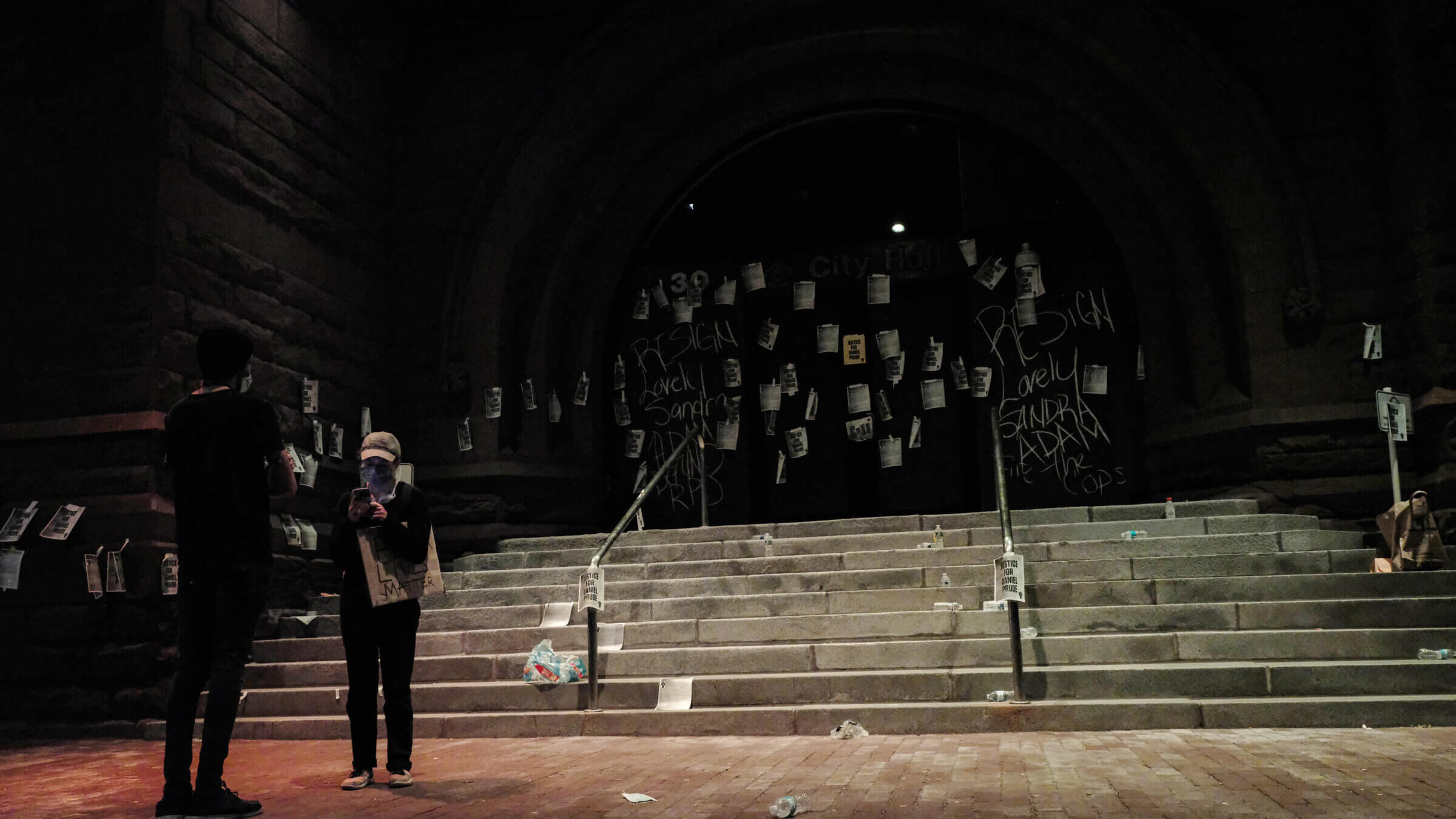A grotesque cartoon and two views of contemporary antisemitism
Rochester’s Jewish federation connected an offensive cartoon to a local ceasefire resolution. A Jewish council member pushed back

Protesters plastered leaflets on Rochester City Hall in 2020 during a demonstration against police brutality. The city in upstate New York has found itself divided over Israel in recent months. Photo by Getty Images
“Antisemitism Notebook” is a weekly email newsletter from the Forward, sign-up here to receive the full newsletter in your inbox each Thursday
Jason Yungbluth draws and sells erotic comic strips on his website. But he took a break from that work earlier this month to send officials in upstate New York’s Monroe County, which includes Rochester, a cartoon satirizing what Yungbluth believed was the local Jewish federation’s undue influence over local politics.
The cartoon is undeniably offensive (warning: the image is hosted on his website alongside other graphic content). It depicts Meredith Dragon, chief of the federation — which Yungbluth calls an “Israeli pressure group” — in a dominatrix outfit emblazoned with an Israeli flag. She’s forcing Adam Bello, the county executive, to lick her boot. Michael Yudelson, another county official and local synagogue president, stands ready to brand Bello with the federation’s logo.
“Make those boots shine Adam!” Yudelson says. “We don’t want to have to get the ADL involved, do we?”
Rather than treat Yungbluth’s cartoon, and his attached letter calling on county officials to take down an Israeli flag they’ve been flying since October, as the work of a lone crank, Bello and Yudelson publicized the image in order to condemn it.
The Jewish Federations of North America followed suit, sending Yungbluth’s cartoon to reporters across the country and making the case that it represented what Jews across the country are up against: “The rhetoric and vitriol against Jews and Israel has been very consistent,” Evan Bernstein, who leads community relations for the federation network, told me.
It was no coincidence to Dragon that the Rochester City Council passed a ceasefire resolution just days after Yungbluth sent his cartoon to the county. In Dragon’s view, the resolution was also antisemitic, an outgrowth of antisemitic rhetoric at local protests and public meetings. Approving it on the heels of the news about a cartoon that showed evil-looking Jews controlling public officials could be perceived as tacit approval for the offensive tropes the image invoked.
“My fear is that those who are involved in these rallies will continue to use these terribly antisemitic tropes and they’re going to be emboldened by the city council,” Dragon said in an interview.
A different perspective
This argument has frustrated Mitch Gruber, Rochester’s only Jewish council member, who ultimately voted against the ceasefire resolution but defended his colleagues from the accusations of antisemitism. To Gruber, the cartoon — which was about a county rather than city dispute — just offered convenient ammunition for the federation.
“There was no such thing as a ceasefire resolution that was not going to lead to these claims of antisemitism,” said Gruber, who initially worked with Dragon on changing problematic language in the resolution. “There just wasn’t.”
Dragon told me that “it’s not true” that she would have described any ceasefire resolution as antisemitic. But she also said that for the council to criticize Israel without commenting on other foreign issues represented an antisemitic double standard.
Without oversimplifying the complexities of Dragon and Gruber’s perspectives on what happened in Rochester, this dust-up also shows two contrasting views of how the Jewish community should engage with the rising antisemitism and the political movement against Israel that has exploded since Oct. 7.
One view sees little daylight between the most obvious incidents of antisemitism, like bomb threats called into synagogues, and strident political speech against Israel: Of course a ceasefire resolution demonizing Israel came on the heels of an antisemitic cartoon.
The other perspective holds that you can’t automatically connect even offensive political speech about Israel to other cases of antisemitism, and that doing so is part of its own problematic trend: Of course the federation called a resolution criticizing Israel antisemitic and connected it to something totally unrelated.
Gruber said Jewish leaders should call “balls and strikes,” and aim to serve as dispassionate arbiters of what is and isn’t antisemitic. But he realizes that may be too much to ask during the current political climate.
“Nuance and complexity is oftentimes lost in a world that is incredibly — if not almost exclusively — polarized,” Gruber said. “I accept that.”






















